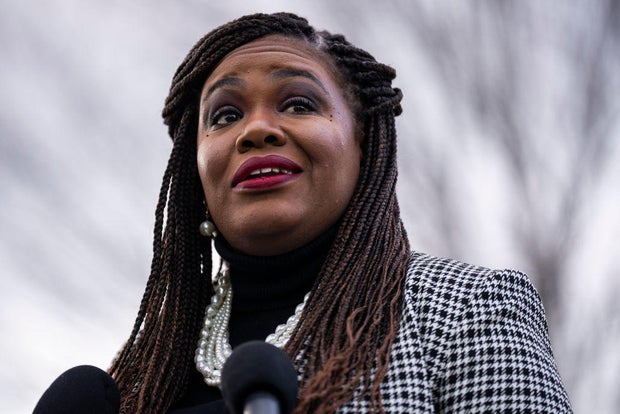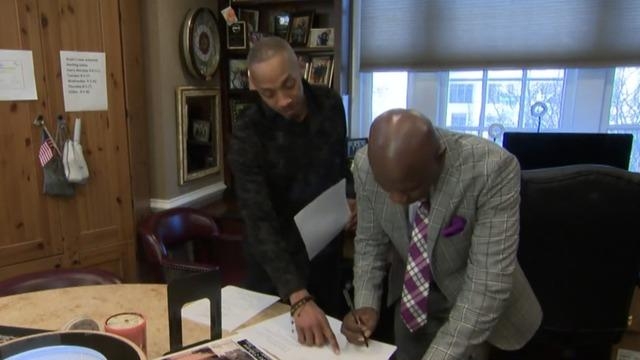
Washington — As Americans commemorate the emancipation of enslaved people on Juneteenth, Democratic Rep. Cori Bush of Missouri is using the federal holiday to advance new legislation for reparations for their descendants.
“This is the moment to put it out and we needed something like this,” said Bush. “I feel it is the first of its kind on the Congressional Record.”
Bush introduced H.R. 414, The Reparations Now Resolution, in May. The 23-page measure makes the case for federal reparations, citing a “moral and legal obligation” for the U.S. to address the “enslavement of Africans and its lasting harm” on millions of Black Americans.
The bill would support other pieces of reparatory justice legislation and formally acknowledge the momentum of state and local reparations movements. The Missouri Democrat believes ongoing efforts in Evanston, Boston, San Francisco and her hometown of St. Louis could galvanize support for reparations on the federal level.
“Our mayor just put together a commission to be able to work on what reparations would look like for St. Louis,” said Bush, who has the backing of nearly 300 grassroots organizations. “Because we’re seeing it on the local level, that’s where a big part of that push will come from, I believe.”
The resolution does not stipulate direct cash payments but recommends the federal government pay $14 trillion “to eliminate the racial wealth gap that currently exists between Black and White Americans.”
 Rep. Cori Bush speaks during a news conference outside the U.S. Capitol on Thursday, Jan. 26, 2023.
Rep. Cori Bush speaks during a news conference outside the U.S. Capitol on Thursday, Jan. 26, 2023.
Tom Williams/CQ-Roll Call, Inc via Getty Images
Bush called it a “starting point” and cited scholars who estimate the U.S. benefited from over 222 million hours of forced labor between 1619 and the end of slavery in 1865, a value of approximately $97 trillion today.
“This country thrived and grew through the planting and harvesting of tobacco, sugar, rice and cotton, all from chattel slavery, and that hasn’t been compensated,” she said.
The legislation builds upon a decadeslong push in Congress for reparations. Earlier this year, Texas Rep. Sheila Jackson Lee and New Jersey Sen. Cory Booker, both Democrats, reintroduced H.R. 40 and S.40, which would establish a commission to study and develop reparations proposals for African Americans. Democratic Rep. Barbara Lee of California also re-upped a bill last month to create the first U.S. Commission on Truth, Racial Healing and Transformation to examine the impact of slavery.
Lee is one of several Democratic co-sponsors of Bush’s resolution. Bush said she is waiting to hear from House Democratic leadership on her measure but realizes it could be a non-starter for Republicans in the GOP-controlled House who contend reparations could be too costly and divisive.
“I am going to be calling folks out on this,” Bush forewarned. “There has to be restitution and compensation. There has to be rehabilitation and so that is what I’m going to throw back at them.”
A Pew Research Center study found 48% of Democrats surveyed believe descendants of enslaved people should be repaid in some way, while 91% of Republicans think they should not.
A progressive, second-term lawmaker, Bush spent two years working on the reparations resolution. She said it was one of her top priorities before she was sworn into Congress, dating back to her time as a community activist.
“I remember being on the ground in Ferguson and feeling like, ‘Hey, we’re doing all of this on the ground but we don’t have anybody in Congress that’s like picking this up and running with it,'” Bush recalled. “We’re making these soft pitches, and [there’s] nobody to hit a home run. Well, that has changed. So now we’re in a position to hit the ball.”








